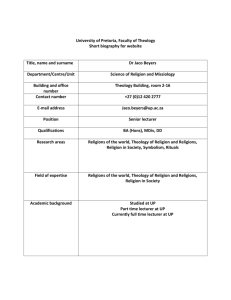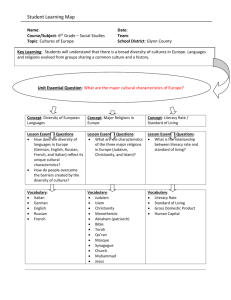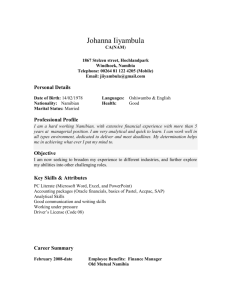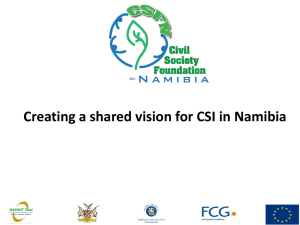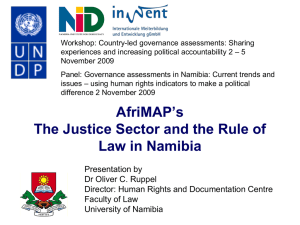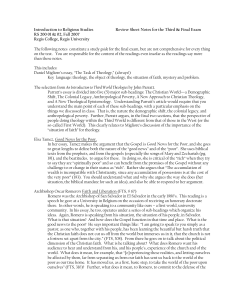REL 346.doc - Augsburg College
advertisement
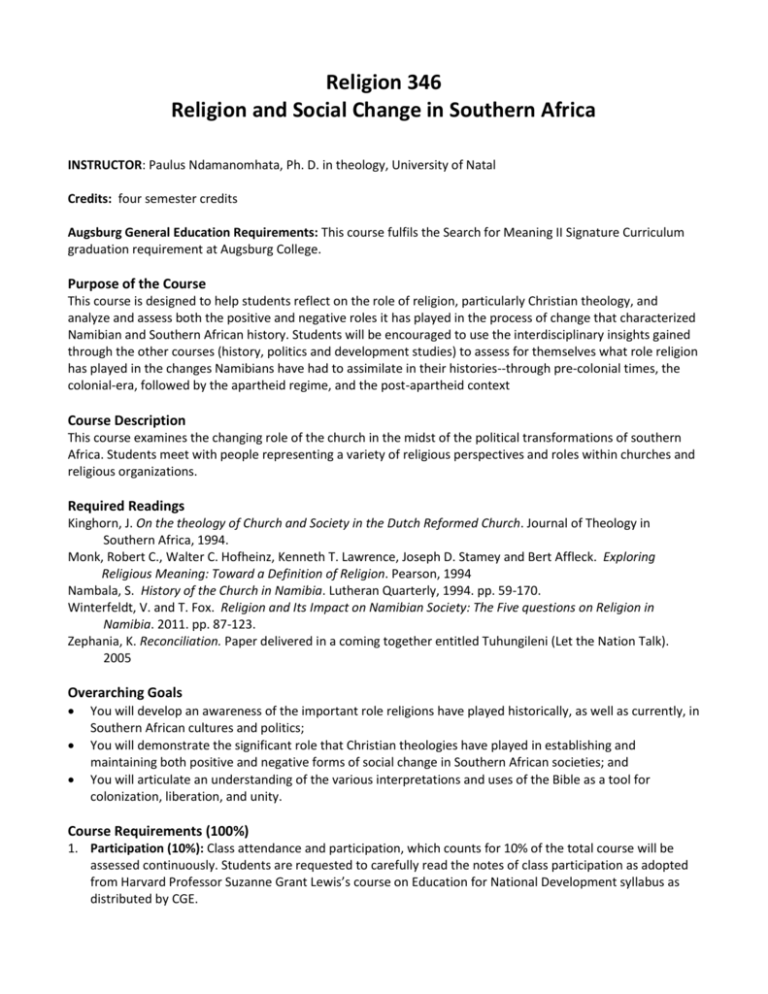
Religion 346 Religion and Social Change in Southern Africa INSTRUCTOR: Paulus Ndamanomhata, Ph. D. in theology, University of Natal Credits: four semester credits Augsburg General Education Requirements: This course fulfils the Search for Meaning II Signature Curriculum graduation requirement at Augsburg College. Purpose of the Course This course is designed to help students reflect on the role of religion, particularly Christian theology, and analyze and assess both the positive and negative roles it has played in the process of change that characterized Namibian and Southern African history. Students will be encouraged to use the interdisciplinary insights gained through the other courses (history, politics and development studies) to assess for themselves what role religion has played in the changes Namibians have had to assimilate in their histories--through pre-colonial times, the colonial-era, followed by the apartheid regime, and the post-apartheid context Course Description This course examines the changing role of the church in the midst of the political transformations of southern Africa. Students meet with people representing a variety of religious perspectives and roles within churches and religious organizations. Required Readings Kinghorn, J. On the theology of Church and Society in the Dutch Reformed Church. Journal of Theology in Southern Africa, 1994. Monk, Robert C., Walter C. Hofheinz, Kenneth T. Lawrence, Joseph D. Stamey and Bert Affleck. Exploring Religious Meaning: Toward a Definition of Religion. Pearson, 1994 Nambala, S. History of the Church in Namibia. Lutheran Quarterly, 1994. pp. 59-170. Winterfeldt, V. and T. Fox. Religion and Its Impact on Namibian Society: The Five questions on Religion in Namibia. 2011. pp. 87-123. Zephania, K. Reconciliation. Paper delivered in a coming together entitled Tuhungileni (Let the Nation Talk). 2005 Overarching Goals You will develop an awareness of the important role religions have played historically, as well as currently, in Southern African cultures and politics; You will demonstrate the significant role that Christian theologies have played in establishing and maintaining both positive and negative forms of social change in Southern African societies; and You will articulate an understanding of the various interpretations and uses of the Bible as a tool for colonization, liberation, and unity. Course Requirements (100%) 1. Participation (10%): Class attendance and participation, which counts for 10% of the total course will be assessed continuously. Students are requested to carefully read the notes of class participation as adopted from Harvard Professor Suzanne Grant Lewis’s course on Education for National Development syllabus as distributed by CGE. 2. Student Lecture Series (15%): Working in groups of 2-3, each group of students will sign-up to instruct one of the classes. Through a combination of readings, lectures, individual and group reflection, outside visits, guest lectures, and any and other media sources relevant and of your choosing, the following key units will be focused on: 3. Essay and Creative Project: Religion and Social Change Autobiography (20%): Write an autobiographical essay (approximately 3-4 pages) and prepare a 10 minutes creative project presentation describing the development and evolution of your own critical analysis of religion and social change. How has religion/spirituality created change in you individually, in your family, in your community, in your country and in the world? In the future, what role do you see religion playing in social change and what role do you see yourself playing? 4. Essay: Christianity and African Traditional Religions (15%): Explore how African Traditional Religions paved the way for Christianity, which is the dominant religion in Namibia today. Discuss the similarities, differences and integration found between the two as well as the impact of Christianity on the traditional African religions which had previously dominated Namibian and South African spiritual belief. Then, evaluate any potential pros and cons of the introduction or imposition of Christianity in southern Africa, providing specific examples from the required readings, as well as presented theories and perspectives from relevant guest speakers whom you have heard address this topic. Make connections to your own experiences. Page length is 4-5 typed double spaced pages. 5. Essay: Religious Diversity, Reconciliation, and Contemporary Society (15%): The purpose of this essay is to evaluate the contributions to social issues and social change in Namibian society made by Christianity, cultural traditions, and minority religions. This essay will pull from a variety of research methods: Interview/observation/participation: While at your homestay, discuss the historical relationships among Christianity, cultural traditions, and minority religions. Research from related course material, as well as any additional relevant sources. Relevant class speakers, lectures, and class discussions. 6. Final Integrative Project (25%): Final projects will address the Development Process, Religion, Political Science, History and Internship courses: This project can be done individually or in groups of up to three students. Projects should be creative (a play, a calendar, musical piece, etc.), and should: 1) be rooted in critical analysis of issues important to Namibia and/or South Africa, 2) draw upon your own experiences, and 3) be a synthesis of your learning that can be used to educate others on key issues facing Namibia and/or South Africa. Although this is an integrative project, each instructor will grade the final projects separately. Course Design Week 1: Week 2: Week 3: Week 4: Week 5: Week 6: Week 7: Week 8: Religion, Self and Society African Traditional Religions Religion, Apartheid & Liberation Christian Religion in Namibian History Religion, Human Rights & Reconciliation in Namibia Contributions of Minority Religions to Social Change in Namibia Churches’ advocacy regarding HIV/AIDS Wrap-up Teaching Methodology Working in groups of 2-3, each group of students will sign-up to instruct one of the classes. Learning will occur through a combination of readings, lectures, individual and group reflection, outside visits, guest lectures, and any and other media sources relevant. Additional Comments Explanation of Grades Augsburg College uses a numerical grading system using the following definitions: Number 4.0 3.5 3.0 2.5 2.0 1.5 1.0 0.5 0.0 Letter Equivalent A A-/B+ B B-/C+ C C-/D+ D DF Percentage 93-100% 88-92% 83-87% 78-82% 73-77% 68-72% 63-67% 60-62% Under 60% Augsburg Definition Achieves highest standards of excellence Achieves above basic course standards Meets basic standards for the course Performance below basic course standards Unacceptable performance (no credit for the course) A “Pass” grade is 2.0 or above. Grading Policy and Late Assignments You must submit assignments on time. If you need an extension, you must talk to us in advance to negotiate a new deadline. If you have not been given an extension in advance and you turn in a late assignment, you will be docked half a grade (from a 4.0 to a 3.5 or 3.5 to a 3.0, 3.0 to a 2.5, 2.5 to a 2.0, etc.) If you are more than one week late, you will be docked a full grade. No assignments will be accepted more than two weeks after the original deadline; a “0” will be given after that. Assignments due near the end of the semester will not be accepted after the last day of the semester. Augsburg Honesty Policy You are expected to follow the Augsburg Honesty Policy which is printed in the program manual. We assume that you have read the honesty policy, understand it, and are following it. Except when the assignment expressly encourages group work, it is assumed that all course work will be your own. You may not copy other students’ work. The first occurrence of plagiarism will result in the failure of the assignment. A student who commits plagiarism a second time will fail the course. Students’ Rights and Responsibilities Students with formally diagnosed learning or physical differences have legal rights to course modifications. Those who qualify should identify themselves to the instructor as soon as possible in order to obtain extra assistance.

